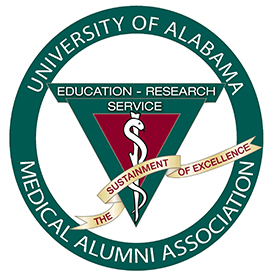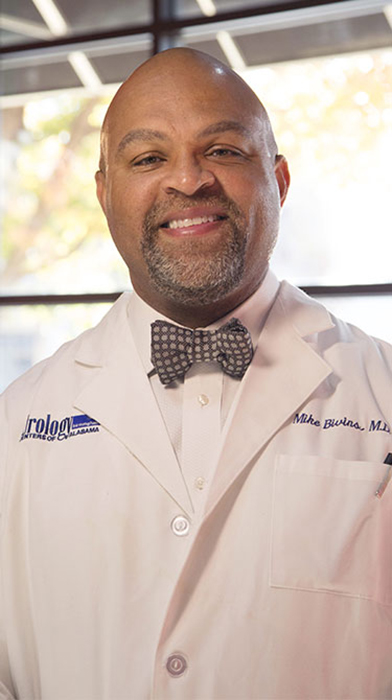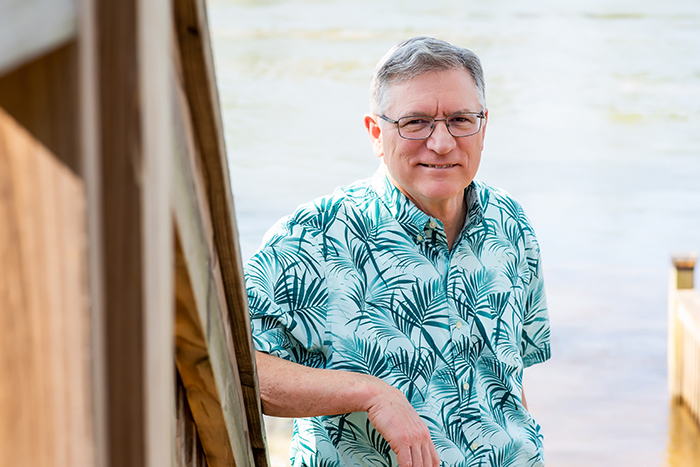 V. Michael Bivins, M.D., knows something about growing up in a small town with dreams of a career in medicine. A Brundidge, Alabama, native and 1996 School of Medicine graduate, Bivins is the president-elect of the University of Alabama Medical Alumni Association (MAA). He and current MAA President John Wheat, M.D., are heading a taskforce the MAA has formed around supporting scholarships for medical students who are from populations that are underrepresented in medicine (URiM), and increasing diversity in Alabama’s health care workforce.
V. Michael Bivins, M.D., knows something about growing up in a small town with dreams of a career in medicine. A Brundidge, Alabama, native and 1996 School of Medicine graduate, Bivins is the president-elect of the University of Alabama Medical Alumni Association (MAA). He and current MAA President John Wheat, M.D., are heading a taskforce the MAA has formed around supporting scholarships for medical students who are from populations that are underrepresented in medicine (URiM), and increasing diversity in Alabama’s health care workforce.
“The MAA recently donated $100,000 for scholarships for qualified in-state medical students from URiM groups, and those funds have been matched by the Dean’s Office,” Bivins says. “We are also working to help students who are interested in science get into premed programs. That includes making sure they understand what they need to do to get qualified for medical school.”
 V. Michael Bivins is president-elect of the Medical Alumni Association.Selwyn Vickers, M.D., FACS, senior vice president for medicine and dean of the UAB School of Medicine, says both the gift and the MAA’s enthusiasm for the school’s diversity and inclusion efforts are critical to their success. “Diversity is vital to excellence,” he says. “In order to attract the best people to an organization and have the best ideas within an organization rise to the top, an environment must exist that is inclusive and diverse. We are immensely grateful for the MAA’s support and leadership in this area.”
V. Michael Bivins is president-elect of the Medical Alumni Association.Selwyn Vickers, M.D., FACS, senior vice president for medicine and dean of the UAB School of Medicine, says both the gift and the MAA’s enthusiasm for the school’s diversity and inclusion efforts are critical to their success. “Diversity is vital to excellence,” he says. “In order to attract the best people to an organization and have the best ideas within an organization rise to the top, an environment must exist that is inclusive and diverse. We are immensely grateful for the MAA’s support and leadership in this area.”
Bivins knows firsthand the benefits of being able to connect with other students and mentors who faced some of the same challenges getting accepted to and navigating medical school. Before Bivins earned his undergraduate degree from The University of Alabama, he participated in co-op programs during high school. “What lightened the burden for me was having other students around me who also felt a little lost,” Bivins says. “So when you are in a group of lost people, you don’t feel quite as lost.”
Entering medical school at UAB meant adjusting to a new city and a new learning environment, while also finding your identity. “If you have a bunch of new information coming at you, it can be a little overwhelming,” Bivins says. “I commend the School of Medicine because they have the Office of Diversity and Inclusion that can help these young people get acclimated.”
John Wheat, M.D., a 1976 School of Medicine graduate and the current MAA president, has a passion for encouraging Alabama kids to contribute to answering the most pressing patient care needs within the state. He founded and, for 21 years, directed the Rural Medical Scholars Program, which is intended to address the shortage of primary care physicians in Alabama’s rural communities. On average, 11 students are admitted to the five-year medical education program of The University of Alabama and the UAB School of Medicine. Rural Alabama students enter the program that includes early admission to the School of Medicine, and is preceded by a master’s in Rural Community Health.
“It all starts with getting kids from those communities—who grew up in small towns and know that culture—involved in medicine,” Wheat says. “Once we do, how do we help sustain them in these communities so they feel they are just as respected professionally as they would be in Birmingham, Huntsville, or Atlanta? And how do we help them maintain their identity with their communities and their desire to be there? These questions have implications for how you educate these students. They also have implications for how you get them into medical school. Some kids are going to look different on paper from the typical medical student, but it’s not because of a lack of academic firepower. It’s a different kind of exposure they had growing up. Providing flexibility in the way these students engage with medical education goes a long way toward effectively developing their potential for excellence in academic and clinical reasoning.”
 John Wheat is currently president of the Medical Alumni Association.
John Wheat is currently president of the Medical Alumni Association.
“I would say it’s not just rural areas that are highly underserved,” Bivins says. “There are urban areas also that have the same challenges around poverty, education, and access to health care. All those things seem to travel in the same pack.”
As Wheat and Bivins work on the MAA taskforce that is tackling issues of representation and diversity in medicine, Wheat is enthusiastic about the potential of Alabama students when it is paired with the expanded opportunity that these new scholarships will represent.
“Right now, what excites me most is the discussions we’re having with Dr. Vickers about how to get more qualified URiM students into the School of Medicine,” Wheat says. “I am proud the MAA board has become very energized around that idea and really pushed us in that direction. I think that will be a big story coming out of the MAA for the next two, three, or four years.
By Brian Hudgins